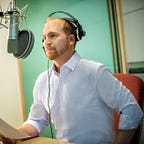At 50, All Things Considered is Still Learning
“Radio sentences should be short.”
That was my first lesson on my very first day as an intern for NPR’s All Things Considered.
They were words uttered in September, 1999 by the show’s longtime host, Robert Siegel. I had been plopped onto his office couch in Washington, DC while a producer went to the NPR library to get any information she could find about East Timor, which was in the news that day.
I was only 17 at the time, on a gap year between high school in central Illinois and college in central Illinois, and had never heard of East Timor. Back then, it was part of Indonesia, and was in NPR show rundowns quite a bit because of an independence movement that turned violent. Think about that: a small province in Indonesia consistently topping a national news program. I suppose my second lesson at All Things Considered was that they really did consider all things!
After my brief time on Robert’s couch, I was given a small desk in between two of the show’s powerhouse bookers, and would help them stock the program with interviewees each day. I had a phone and a computer with a bulky monitor. Producers were still cutting interviews with razor blades and reel to reel tape and bookers were transitioning from rolodexes to internet search engines. As a 17 year old, I could navigate the web (I still used Yahoo back then!) better than most people on the staff.
That helped when just a few weeks into my internship, Hurricane Floyd slammed into North Carolina, and I scoured the internet for phone numbers in Cape Fear. I eventually found someone who had stuck around for the storm and booked him on the show. It was a powerful conversation, and led to my first bit of praise from the otherwise gruff senior producer. He emailed me to tell me it was the best thing on the program that day. My third lesson: authentic conversations with “real people” make All Things Considered stand out.
My time as an intern at ATC, which stretched from one semester to two, was filled with lessons, and not just for me. The entire staff wanted to learn, and to allow the listeners to learn with them. That is media at its best, and it is a big reason why All Things Considered has been around for fifty years.
I learned about photography when I accompanied legendary host Linda Wertheimer to the Corcoran School of Art and Design for an interview with Annie Liebovitz. I went to Charlottesville, Virginia on a trip with a hotshot new reporter named Guy Raz to learn about an emerging threat to the music industry that was popping up on college campuses called Napster. And I learned about the Supreme Court when the great Nina Totenberg descended from her cubicle one floor above with minutes until airtime and explained the latest case before the court to the audience with seemingly effortless skill.
That internship at All Things Considered led me to spend more than two decades in public radio. I worked at member stations, the network and its bureaus as a producer, reporter and eventually host. From different perches, I heard different perspectives on ATC. It was a beacon, a competitor, the flagship show, or an arrogant program that had outlasted its usefulness. It was engaging or it was boring. The interviews were tough or they were filled with softballs. The segments were too long or they were too short.
But through it all, I knew deep down that at its core, the show had something special: a degree of humility that gave it just the right amount of context to tell the stories of America every day. To hold politicians accountable and bring the news from Washington and Beijing, but also to go inside an artist’s studio or a scientist’s lab and elevate their work and passion to the same level. That was the most important lesson of All Things Considered.
In the world of 24-hour cable news (and now social media), I kept that lesson in mind as we built Here & Now into the midday version of All Things Considered, and it worked. We tripled the audience to more than five million in just a few years, expanding to nearly every major radio market in America. There was still an appetite for solid journalism mixed with humanity, wonder and education.
Journalism has changed a lot in the 21 years since my internship, and certainly in the fifty years since All Things Considered started. Listeners and readers are busier and more distracted and therefore want shorter stories. We can see instantly which news items do best online and which ones bring in the most audience comments. And in the audio business, there is a constant drumbeat that traditional radio is near its end (back in 1999, the fear was that satellite radio would kill NPR; it didn’t) and will soon be replaced by streaming and podcasts.
I hope, however, that whatever changes occur, those of us in the media industry will keep in mind the enduring lessons of All Things Considered. Most of all, that a curiosity about the world and constant thirst for knowledge combined with humility and humanity is a recipe for success that will stand the test of time.
